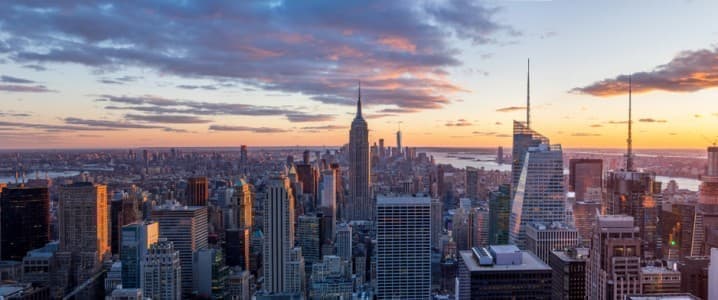New York is the latest of several American and European cities to announce new gas-use curbing policies, through a ban on natural gas connections to new housing. There has been speculation that governments may start to restrict the residential and commercial use of gas as they aim to achieve net-zero carbon emissions sooner than originally intended. However, few countries have set a clear date for when to cut gas use, as many see it as a means to bridge the gap between dirtier fossil fuels and the sufficient availability of renewable alternatives. There have been several moves by state governments over the past year to curb the use of gas within the next decade. This week, the New York City Council moved to ban natural gas hookups for new buildings. The Act is expected to come into effect by late 2023 in several buildings under seven stories, and by 2027 for taller buildings. Although certain businesses, such as restaurants and hospitals, are exempt.
While existing buildings do not currently fall under the ban, new construction proposals after 2027 will have to use electricity rather than gas for heating and cooking. As the sixth-largest consumer of gas in the U.S., this will support the city’s plan to decarbonize. This forms a key part of its clean energy standard, as New York hopes to run on 70 percent renewable electricity by 2030 and use 100% carbon-free electricity by 2040.
Mayor Bill de Blasio stated of the ban, "If the largest city in America can take this critical step to ban gas use, any city can do the same". Further, "This is how to fight back against climate change on the local level and guarantee a green city for generations to come."
Similar bans have already been announced in other parts of the U.S. such as the ban on appliances, like gas furnaces and gas water heaters, in new builds in Seattle. The ban, introduced in February, applies to commercial spaces and buildings over four stories tall. New constructions will also be required to have energy-efficient windows, insulation, lighting, and ventilation systems. However, residential housing under four stories does not fall under this type of legislation.
Similarly, in November last year, San Francisco announced a ban from June 2021 on natural gas heating, gas appliances, and gas fireplaces in new constructions. This ban affected the planned development of 54,000 homes as well as all future construction plans. The city Board of Supervisors stated decarbonization as the main driver for the ban and the prevention of fires or gas leaks during earthquakes as a secondary incentive.
San Francisco District 8 Supervisor Rafael Mandelman stated, “All-electric construction in new buildings is a critical step toward a safer, healthier San Francisco and planet for future generations.”
Buildings in New York, Seattle, and San Francisco, alongside air travel, account for the majority of the cities’ greenhouse gas emissions, meaning moves to reduce CO2 waste from housing and commercial spaces will greatly support the battle against climate change.
Meanwhile, in California, both gas appliances and certain outdoor equipment, such as lawnmowers that run on gasoline, could soon be banned. In August, energy regulators in the state approved new energy efficiency standards to expand the use of electric appliances for heating and water in new homes and businesses. California has been revising its gas use since around 2019, with over two dozen cities having passed measures to reduce natural gas use in that time.
Related: Europe’s Gas Prices Plunge As Russia Signals More Supply Is Coming
But it’s not just fossil-fuel use in buildings that California is targeting. The state is also considering plans to ban the sale of gasoline-powered outdoor power equipment after January 2024 and gas-powered home generators by 2028. These new policies would target personal use, whereas several green initiatives to date have affected industry, meaning individuals will be made to change their habits. Both natural gas and petrol product use will be curbed for residents of California should these plans go ahead.
And it’s not just in the U.S. these moves to curb personal fossil fuel use are going ahead. Rumours in the U.K. have been circulating over the last few years around gas boiler bans. Leading energy firm EDF expects the government to ban gas boilers starting as early as 2025, as part of its plan to achieve net-zero by 2050.
To date, no such ban has been introduced, despite hints at new policy during the COP26 summit. Instead, the government is incentivising homes to make the switch with a $6600 grant to install low-carbon head pumps, aimed at 90,000 houses. But critics say this is just a drop in the ocean. With a population of around 70 million, environmentalists are calling on the government to implement a clear plan to phase out gas use in the U.K.
ADVERTISEMENT
As gas bans spread across the U.S., alongside curbs in other personal petrol product use, and conversations heat up in the U.K., it appears only a matter of time until cities around the world push for a switch away from natural gas to renewable alternatives, in both commercial spaces and homes.
By Felicity Bradstock for Oilprice.com
More Top Reads From Oilprice.com:
- Russia Puts The Blame On Europe As Energy Crisis Worsens
- U.S. Onshore Gas Flaring Falls To Lowest Level Since 2012
- The White House Just Put The Oil Export Ban Rumor To Rest



















Renewables on their own aren’t capable of satisfying the electricity needs of people without major contributions from natural gas and nuclear energy because of their intermittent nature.
This begs the question as to how the electricity in the new buildings will be sourced: solar, nuclear or hydrocarbons?
Dr Mamdouh G Salameh
International Oil Economist
Visiting Professor of Energy Economics at ESCP Europe Business School, London